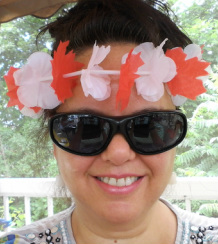 Canada Manufactures Canadians Living in Canada as I do, I encounter proud Canadians all the time, more so around the time of Canada Day celebrations. The commonly held view put forward by these proud Canadians is that Canada is the country where they were born, and that Canada is the country that welcomed their parents and grandparents with open arms and gave them their new beginning they so very much needed. Given this, they tell me. “A proud Canadian is who I am”. As an Algonquin Anishinaabe-kwe I experience these “proud Canadian statements” as both racist and ungrounded. Unfortunately for both of us proud Canadians are usually offended when I tell them so. I experience “proud Canadian statements” as racist because Canada the nation state was built on racist and genocidal policies that were and are harmful and disenfranchising to Indigenous peoples. As an Indigenous person I know that these racist and genocidal policies continue to exist today in the form of the Indian Act, and the Comprehensive Land Claims and the Self-Government policies. While the Indian Act imposes colonial law and poverty on Indigenous nations, the Land Claims and Self-Government policies take advantage of this same poverty and impose a negotiation process that offers very little in terms of genuine self-government and long term viability. In this way Canada pushes Indigenous people into unsustainable living conditions, and then imposes policies on them that assure their termination as distinct social political entities. When I reflect on this I realize this Canadian made genocidal process takes place in large part because most Canadians do not have the time and mind space to determine for themselves that genocide is what it is. Upon reflection, I have learned that this is the way that genocide sometimes operates – right in front of people’s eyes, yet these same people can’t see it because Canada has blinded its citizens ability to see it. Genocide in plain sight is the worst form of genocide to raise awareness about. I have found that in my process of making the invisible visible, most people get angry at me. They get angry because I am challenging their treasured ideology of Canada, the great and benevolent country. What Canadians need to realize, though, is that this emotional reaction is oftentimes the nature of new knowledge. People become emotional with new knowledge because they have become destabilised in terms of what is dear to them. While you may be emotional about my statement that I find “proud Canadian statements” racist – this does not mean I am incorrect. Indeed Canada, and all it has become, is racist and genocidal. While this may explain why I experience “proud Canadians statements” as racist, this does not explain why I also experience them as ungrounded. I perceive them as ungrounded because the story of Canada has no real cultural depth beyond that of a song, a flag, and a fictional story of two founding nations: the British and the French. Through effective strategies of nationalism, strategies that deny and supress genuine cultural meaning, when people find themselves in moments of despair they have no cultural knowledge of who they are and how to find their way home. Instead they find themselves in a dark cave where all they are able to do is drink, eat, and shop for example. In this way, while Canada may claim to respect who people are, most people void of their ancestral Indigenous knowledge which include prayer, song, dance, and ritual are particularly lonely and thus vulnerable in moments of despair. Let’s face it, nationalism is unable to provide the necessary medicine when people need it most. We are all Indigenous to the earth and we are all born into rich ancestral traditions of Indigenous cultural knowledge. Indigenous knowledge is the cultural knowledge that has shaped your ancestors since time immemorial; it is the cultural knowledge that has stood the test of time. Yet, in the process of shaping proud Canadians, Canada breaks down and dismisses this precious ancestral knowledge. In this way, “Canada the Great” actually lets proud Canadians down when they are in most need of a cultural backbone to guide them to a safe place. The Need for a Paradigm Shift Humans are in need of a huge paradigm shift, much like the one that took hold regarding the earth and the sun − that being that it is the earth that orbits the sun rather than the sun orbiting the earth. The current economic and materialistic paradigm is harming all life on earth. Indigenous people − again, we are all Indigenous to the earth − who remain rooted in their own life sustaining Indigenous knowledge are at once both the canaries suffering the most from the current paradigm, as well as the holders of the ancient Indigenous knowledge systems required for the much needed paradigm shift. The problem is that nation states such as Canada have been very successful at monopolizing people’s mindsets in a way that they are convinced that they are “people of a country” rather than “Indigenous people of the earth”. Nationalism has also been successful at convincing Canadians that Indigenous knowledge philosophy and culture is primitive, non-progressive, and thus unworthy of being respected as a valid source of knowledge. What is worse is that nationalism has been successful at convincing proud Canadians that their hard earned tax dollars are being squandered by the Indigenous people of Turtle Island. In doing this, Canada creates a blinding system where proud Canadians are unable to see the source of the environmental destruction, and the very real value of earth centred Indigenous knowledge systems. Unfortunately, because nation states are stuck in the current paradigm, and because they hold the financial power and all that it provides such as institutional power to control people, individuals who are already overworked and over tired do not have the time to do the work needed to learn the truth. Despite this we need to keep in mind that Canada will only teach you what will serve their paradigm – even if that paradigm is harming all life on earth, your children’s lives and their children’s lives included. Do not underestimate the role that state nationalism has had on your mind set and practices. Some Interesting Historical Facts about Canada
I want to share with readers some of the history that the foundation of Canada rests on. Most Canadians are unaware of this knowledge as the state’s education system opts not to teach this truth: · The 1869 Gradual Enfranchisement Act was implemented to destroy Indigenous self-government. The election of Chiefs and Councillors became the exclusive process for male band members only. · In 1869, Indigenous governance practices, such as gender balance, consensus decision making, wampum diplomacy, and restorative justice, were outlawed. · In 1869, all rules, regulations, and elected Indigenous officials were subject to confirmation by the government of Canada, whereby they could depose the leaders that they did not approve of. · Through the 1876 Indian Act, when an Indigenous woman married a White man she became a White woman and was no longer considered an Indian. As a result, she and her children had to leave their home community. · Beginning in the 1880s, Indigenous traditional culture was deemed a criminal offense. Cultural traditions criminalized consisted of prayer, song, dance, drumming, the sacred pipe, giveaways, the vision quest, the sun dance, the sweat lodge, smudging, traditional dress, and the potlatch. · Beginning in 1886, Indians could not leave their reserve community unless they obtained a pass from the Indian agent. · To reduce the effectiveness of Indigenous leaders and organizations, in 1927 it became illegal for Indians to hire lawyers or advisors to help them with their grievances against the government of Canada. · In 1936, Indian agents were granted the power to preside at, and direct, band council meetings, as well as cast the deciding vote in elections in the event of a tie. · It was not until the 1960s when Indian people could vote in Canada. If they wanted to vote before this date they had to give up being an Indian. Dr. Lynn Gehl is an Algonquin Anishinaabe-kwe from the Ottawa River Valley. She has a section 15 Charter challenge regarding the continued sex discrimination in The Indian Act, is an outspoken critic of the Ontario Algonquin land claims and self-government process, and recently published a book titled Anishinaabeg Stories: Featuring Petroglyphs, Petrographs, and Wampum Belts. You can reach her at lynngehl@gmail.com and see more of her work at www.lynngehl.com Please like, share, and comment on this Black Face Blog.
12 Comments
 Apparently the Algonquins of Ontario offer is now scheduled to be ratified in the fall. Go ahead and vote "no" based on knowing that 1.3% of our land and a $300 million one-time payment is a terrible offer. The Agreement in Principle (AIP) is now circulating and posted publicly Some Algonquin are prone to argue that you do not have a right to an opinion about the final settlement offer if you have not read this document. My advice to you is do not listen to this argument. For centuries and generations our ancestors are argued for a rightful share of our land and resources They argued this because they knew full well that all that we are as human beings and all that we have comes from the earth. It is only through direct access and jurisdiction to our own land and resources that Indigenous people will be able to live a self-governing and good life. The argument for the right to land and resources as the only road to self-government has been argued by many people such Elijah Harper and Pam Palmater. Read this short blog and watch the video where Elijah speaks of the importance of land and resources: http://www.lynngehl.com/2/post/2011/10/the-wealth-of-algonquin-land.html Government policy, legislation, and AIPs are known to be meaningless entities for Indigenous people. They contain complex jargon, silence on important matters, and confounding elements. Do not feel like you are not entitled to an opinion and a "no" vote simply because you have not read the AIP. Go ahead and vote "no" based on knowing that 1.3% of our land and a $300 million one time payment is a terrible offer. Read this short blog where I summarize what legal experts have had to say about AIPs. http://www.lynngehl.com/2/post/2013/03/trap-slap-and-crap-of-colonial-policy.html The most important knowledge in any AIP is the amount of land and resources that Indigenous people gain. Do not believe otherwise. Do not allow anyone to make you feel inadequate because you have not read the AIP. This is a pitiful argument. It is lawyers and judges that write, read, and interpret these documents. For the most part AIPs are meaningless to the average person. The only thing that really matters is the amount of land and resources that we gain jurisdiction of. Read this short article: http://rabble.ca/news/2013/03/heart-break-algonquin-genocide Go ahead and vote "no" based on knowing that 1.3% of our land and a $300 million one-time payment is a terrible offer. Lynn Gehl is an Algonquin Anishinaabe-kwe from the Ottawa River Valley. She has a section 15 Charter challenge regarding the continued sex discrimination in The Indian Act, is an outspoken critic of the Ontario Algonquin land claims and self-government process, and she recently published a book titled Anishinaabeg Stories: Featuring Petroglyphs, Petrographs, and Wampum Belts. You can reach her at lynngehl@gmail.com and see more of her work at www.lynngehl.com. Please comment on, like, and share this Black Face blog.  For years I have been listening to, and subsequently thinking about, questions such as, “What does the sound of a crow – caw, caw, caw – mean?” For the most part I have found that these questions come from people who are not Indigenous to Turtle Island. I have always found these questions perplexing. Unfortunately, my response is conceptually tough; regardless I will give it my best shot here. The fundamental difference between humans and other animals is our dependency on cultural teachings and the deep meaning inherent. As an example, other animals, as is the case with trees and water, simply do what they do. Humans cannot; we need cultural teachings, and the meaning inherent, to guide us toward the good life. Given this, one has to ask, “Where and how do humans achieve these cultural teachings and the deep meaning that is inherent?” All human knowledge and inherent meaning is constructed and passed on through cultural teachings. The knowledge and meaning serve to help us understand our location within the broader cosmos of the universe, as well as give us guidance and direction in moving forward. These cultural teachings are passed on to us from our ancestors. Contrary to what many people may think, all ethnic groups had and continue to have a rich tradition of cultural teachings that serve them in living the good life. The Indigenous people of Turtle Island do not have the monopoly on cultural teachings and meaning. Please don’t make this mistake of thinking we do. As a matter of fact, knowledgeable Elders suggest that all people’s cultural teachings must be respected. This is what is meant when Anishinaabe Elders offer, “All Creation stories are true”. Quite simply, without cultural teachings and meaning humans are disenfranchised and lost in a world of chaos and disorder. It is Clifford Geertz’s argument that without culture, humans are nothing more than “mental basket cases” (The Interpretation of Cultures 1973, 40). This is a profound statement of how much humans are dependent on culture and the cultural meaning. Conceptually speaking, it is best to think of our collective cultural teachings as analogous to a “cultural meaning field” that we exist within, and that serve us as we move around the world. Just as there are many Indigenous or ethnic groups, there are many cultural meaning fields. Interestingly, cultural meaning fields are not rigidly defined, but rather are open to change through acts of borrowing and sharing from other ethnic groups, as well as through the ebb and flow of our larger ecosystems within the greater cosmos. In this way it is best to think of cultural teachings and meaning as consisting of a fluid body of knowledge rather than a body of knowledge that is static and frozen in a particular place at a particular time. While today some people’s cultural traditions may be laden with meaningless materialism and refuse production, we all are born into a rich cultural history and tradition. Before industrialization and capitalism swept over the earth, all people held a cultural meaning field that they were proud of and that guided them forward. People need to return to this place of being. Anishinaabe spiritual leader Jim Dumont has suggested, “Go back to your own Indigenous knowledge,” be it Russian, Irish, Danube Swabian, Haudenosaunee, or Anishinaabe (personal communication). Furthermore, as Grandfather William Commanda said, “We all need to learn our own teachings the Creator gave us,” as this is where you will find your cultural teachings that will lead to a good life (personal communication). That said, people who do not go back to their own cultural teachings and meaning, and who continually impinge on the culture of the people of Turtle Island, do great harm. While indeed cultural meaning is fluid and open to change, the pressure to provide meaning for too many people outside of our cultural tradition causes our cultural meaning to wear away and therefore become meaningless. There is a limit to what a culture can sustain in terms of remaining meaningful to the Indigenous members of a group. It is for this reason that my only response to, “What does it mean?” can and will always be, “What does it mean to you?” This is my way of suggesting people need to return to their own cultural knowledge and the meaning inherent. Schultz, Emily A. and Robert H. Lavenda (eds). Cultural Anthropology: A Perspective on the Human Condition. 4th ed. Mountain View, CA: Mayfield, 1998. Lynn Gehl is an Algonquin Anishinaabe-kwe from the Ottawa River Valley. She has a section 15 Charter challenge regarding the continued sex discrimination in The Indian Act, is an outspoken critic of the Ontario Algonquin land claims and self-government process, and she recently published a book titled Anishinaabeg Stories: Featuring Petroglyphs, Petrographs, and Wampum Belts. You can reach her at lynngehl@gmail.com and see more of her work at www.lynngehl.com. Please comment on, like, and share this Black Face blog. The Trap of Federal Policies John A. Olthuis and H.W. Roger Townshend provide a legal analysis of the federal government’s Specific Claims Policy that many people will find interesting, and that can be applied to the federal government’s Comprehensive Land Claims Policy and self-government policy known as the Inherent Right Policy. They offer that the policy can be challenged as a violation toward Indigenous people and their lands. While I admit I am not a lawyer, I provide a brief summary of their analysis here. Olthuis and Townshend explain that natural justice is defined by the principles of two related objectives. First, people should not be adversely affected without a hearing, and second, decisions affecting people must be made by an impartial and none biased tribunal. In establishing the Comprehensive Land Claims Policy the federal government has violated/s the principles of natural justice in that they have unilaterally constructed the policy which is therefore biased, and it is the federal government, rather than an impartial body, that judges whether a statement of land claim will move forward, against itself no less. In this way, the federal government has violated and continues to violate the principles of natural justice. Olthuis and Townshend also explain that equity law is a form of justice that is administered according to rules of fairness. Equity law seeks to restore wronged parties to the conditions that would have existed if the breach had not occurred. They also explain that a fiduciary is a person who stands in a position of trust to another. Interestingly, fiduciary responsibility emerges from equity law and as such it is reasonable for a person relying on the fiduciary to expect the fiduciary to act with a degree of fairness, loyalty, and honourable conduct. Equity law and fiduciary responsibilities extend to policy-making and given this, unilaterally drafted federal policies, which construct limitations on Indigenous people in their attempt to live better, are a violation of equity law and the Crown’s fiduciary responsibilities. Olthuis and Townshend also address the issue of whether the compensation amounts awarded First Nations fall within legal guidelines. According to equity law, the general principle behind compensation is that the imposed loss is to be made good where compensation is to be assessed with reference to the value of the assets at the date they are restored rather than the date at which they were improperly taken. This means that any increase in the market value of the assets is the responsibility of the trustee. Olthuis and Townshend argue, “It is our view that the federal specific claims policy and process with respect to validity and compensation violates the principles of equity, the federal constitutional responsibility and the fiduciary duty owed” (82). The Slap of Agreements in Principle Recently I overheard a discussion between two Algonquin that left me feeling on the one hand horrified, yet on the other hand a glimmer of gratefulness that someone has been fulfilling their clan responsibilities. The first person argued that the Algonquin must not dismiss the currently tabled, and soon to be ratified, Algonquin agreement in principle (AIP), “merely on two items”, those items being the amount of land and the amount of resource revenue sharing stated. The other person responded in a way that I thought was simple yet clever. This person stated that if someone was to read through the AIP and gather up as many as twenty-two good points, this larger number – twenty-two – alone does not in itself mean that the two points of land and resources are not the most significant to the Algonquin future. Many people, such as Elijah Harper and Alice Olsen Williams, have long made this argument of the importance of land and resources. That said, it is important to stress that many people are not skilled at reading policy and law, AIPs included. Reading them is the specialized skill of lawyers and policy makers. Olthuis and Townshend are two qualified individuals that have evaluated past AIPs to determine why it is that they cannot be relied upon as a true source of land claims and self-government settlements. They provide a discussion of the James Bay Cree and the Northern Quebec Agreement. In asking, “What is it about the structure of the claims settlements that leads to non-implementation?” Olthuis and Townshend identify three factors that have led to non-fulfillment: A lack of political will on the part of non-indigenous governments; Vaguely worded provisions in the agreements; and, Missing elements (41). A lack of political will is the practice whereby Canada, in their desire to eliminate their constitutional and legal obligations as cheaply as possible, defines their responsibilities in very narrow terms rather than addressing the real issues. In terms of vague provisions, Olthuis and Townshend argue this approach occurs when matters cannot be agreed upon resulting in the issues being papered over. This papering over, or alternatively stated vagueness in agreements, makes it difficult for Indigenous peoples to then rely upon the AIP to assure the fulfillment of their rights. In terms of missing elements, this approach occurs when provisions are excluded in the final agreements, in particular provisions related to jurisdiction of Indigenous governments. As a result, the final agreements lack clarity on the jurisdiction needed to viably operate the programs and institutions established in the very agreements. Thus, although final agreements are achieved, unresolved matters resurface. Olthuis and Townshend conclude that due to a lack of political will, papering over issues, and a lack of jurisdictional clarity, the governments of Canada are merely negotiating a document rather than a viable future for Indigenous people. In the case of the James Bay Cree, the document was one of 450 pages loaded with highly technical and legally complex jargon. Olthuis and Townshend also offer that once these agreements are ratified they are viewed as the beginning of the end of a relationship between governments and First Nations, rather than the beginning of a new relationship, where Indigenous people are then forced to litigate Canada into implementation. At the same time, these final agreements provide for the legislative extinguishment or the release of all Indigenous interests to the territory covered by the AIP. The Union of British Columbia Indian Chiefs offer, “Modern land claims agreements will create a double standard in which the interests of the federal and provincial Crowns and third parties are recognized. These rights will simply continue to exist, they will change and adapt over time, they will continue to live. … The rights of the Indigenous Peoples’, on the other hand, will be frozen and will not grow and adapt. If these rights are not written into the Agreement, they will no longer exist, they will be dead” (n.p.). It is precisely for this reason that Russell Diabo argues, “Canada’s Land Claims and Self-Government policies are far below the international standards set out in the Articles of the United Nations Declaration on the Rights of Indigenous Peoples” and refers to the process as a process of self-termination (4). The Crap of the Algonquin Offer Recently, after hundreds of years of asking that our rights to land, resources, and self-government be respected, and after twenty-three years of negotiating, the Algonquin of Ontario offer was tabled: 1.3% of our traditional territory and a $300 million payment. Finding this settlement offer disturbing Algonquin Anishinaabe-inini Michael Ranger offers, “The Creator entrusted us with protecting this land to ensure it can support future generations. This land is not just ours, it belongs to our children and future generations.” He adds, “They have an interest and stake in this land, how can we legally sell their interest in it?” References Diabo, Russell. “Harper Launches Major First Nations Termination Plan: As Negotiating Tables Legitimize Canada’s Colonialism.” First Nations Strategic Bulletin 10.7-10. June-Oct. 2012. 15 Nov. 2012 <http://intercontinentalcry.org/wp-content/uploads/2012/11/FNSB-July-Oct-12.pdf>. Olthuis, John A., H.W. Roger Townshend. “Is Canada’s Thumb on the Scales? An Analysis of Canada’s Comprehensive and Specific Claims Policies and Suggested Alternatives.” For Seven Generations: An Information Legacy of the Royal Commission on Aboriginal Peoples. CD-ROM. Ottawa: Libraxus, 1997. Union of British Columbia Indian Chiefs. “Certainty: Canada’s Struggle to Extinguish Aboriginal Title.” 23 Feb. 2013 <http://www.ubcic.bc.ca/Resources/certainty.htm#axzz2Nc7YY Zwe>. 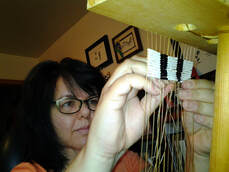 Lynn Gehl is an Algonquin Anishinaabe-kwe from the Ottawa River Valley. She has a section 15 Charter challenge regarding the continued sex discrimination in The Indian Act, is an outspoken critic of the Ontario Algonquin land claims and self-government process, and she recently published a book titled Anishinaabeg Stories: Featuring Petroglyphs, Petrographs, and Wampum Belts. You can reach her at lynngehl@gmail.com and see more of her work at www.lynngehl.com. 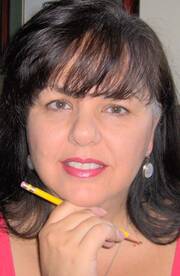 When Prime Minister Stephen Harper offered the residential school apology in the Canadian parliament on June 11, 2008 he stated the reason for doing so was that the lack of one was a barrier to the healing and wellness of survivors. I, though, thought his rhetoric was nothing but a pile of nonsense in that it was void of any real practical value. As an Algonquin Anishinaabe-kwe who has spent a lot time looking at the history of the Algonquin land claims and self-government process at the doctoral level, I know full well that the contemporary process offers, for the most part nothing. The amount of land and resources Indigenous Nations gain in the contemporary land claims and self-government process is so miniscule that viable self-government is not possible. Let’s face it, 1.3% of our land base and three hundred million dollars will not cut it. Clearly the process is not a negotiation between equal nations leading to genuine self-government for Indigenous Nations. Rather, it is a perpetuation of a colonial and patriarchal relationship. In the Anishinaabe tradition knowledge is located in both oratory and the associated practices and rituals that accompany and follow. Oratory and practices/rituals inform and re-enforce one another. As such, Stephen Harper’s words were meaningless to me because at the level of practice the contemporary land claims and self-government process continues to set huge limitations on Indigenous self-government. Thinking through my Anishinaabeg worldview as I do I found Indigenous leader and cultural icon Elijah Harper’s more recent discussion of Stephen Harper’s oral apology of the residential school history and the accompanying practices and rituals interesting and affirming. Elijah, himself a survivor of the residential school system, was a keynote speaker at the “From Indian Residential Schools to Truth and Reconciliation Conference” in Peterborough, Ontario that took place on May 5th and 6th, 2012. This community driven conference was organized by the Kawartha Truth and Reconciliation Support Group which consisted of Indigenous peoples and descendants of settler allies and it was chaired by Alice Olsen Williams. The Truth and Reconciliation (TRC) as most know emerged from the apology that Stephen Harper offered. During his quietly spoken keynote address Elijah Harper relied on his knowledge of parliamentary procedures explaining that the practices/rituals accompanying Stephen Harper’s apology did not match the oratory. Elijah explained that during the reading of the apology parliament was in session in that the Speaker of the House of Commons was in his rightful location – in the Speaker’s chair, and the House of Commons' Mace was in its rightful location – on the Clerk’s table. Elijah explained that these two practices/rituals symbolize that parliament is in official proceedings. These practices/rituals are always in place when foreign dignitaries or heads of state speak in the House of Commons. While these two practices/rituals were adhered to during Harper’s oral reading of the apology, Elijah further explained that when the Indigenous leaders spoke the Speaker of the House left his chair, returning to the floor, and the House of Commons Mace was moved to a non-official location, indicating that parliament was no longer in formal session. It is clear to me that in explaining this lack of harmonization between oratory and practices/rituals Elijah was asking listeners to appreciate that Indigenous peoples were not respected and recognized as the Nations that they are. Elijah, myself, and many others agree on the importance of land and resources in Indigenous self-determination. While talking with him after his keynote he pointed out that during 2010 the Canadian national domestic product was a whopping $600 billion. It was clear to me that Elijah was arguing Indigenous Nations are entitled to our rightful share of the wealth of our resources of our land. Interestingly, during Alice Olsen Williams’ workshop session, where she was show-casing a community quilting project, she began with offering the same position stating, “Give us our land and resources”. It was clear to me that Alice was arguing that this is where genuine reconciliation will be played out. Jan Longboat agreed with the importance of land and resources. This became apparent when Jan stood up and thanked Alice for her wise words. After Elijah finished his keynote address I also had a conversation with the attending Truth and Reconciliation Commissioner, Marie Wilson, a non-Indigenous person. I blatantly informed the commissioner that as an Algonquin Anishinaabe-kwe I find the entire TRC process, meaning the apology and the events that are presently unfolding in Canada, to be patronizing. Of course she defended her position. Regardless, I did not budge; after all, I carry first-hand knowledge about the current land claims and self-government process where Indigenous Nations continue to be denied our land and resources – again the two resources where viable self-government is manifested. Appreciating that I was not going to budge on my position about feeling patronized, the commissioner added that she is doing what the people want and feel is needed. My response to her, though, was “Yes, I understand that people need to feel that their grief has been heard before they can move on, that is if they can move on.” Regardless, I explained “After these people are heard, many may turn their attention to the practices [again where knowledge is] inherent in the contemporary land claims and self-government process, as I and others have, and they may come to realize they were duped by the oral apology”. What I meant by this is that they may come to realize, as I have in my thinking and knowing process, that the practices on the ground fail to meet the oratory of the apology. “Once they find themselves in this place, many may return to a place of feeling manipulated, denied, and lied to. And this new place may be a place of greater disenfranchised grief” I added. In sum, oratory and practices/rituals did not harmonize and inform one another as they should have during Stephen Harper’s apology and in this way fork tongue discourse is alive and well in the Harper government, rather than being a colonial strategy of the past. All this said, some people may wonder, “If I know that the contemporary land claims and self-government process is rooted in colonial practice and the oral apology lacks real substance, why did I bother to attend the TRC conference?” My response is layered. First, I attended the conference because I wanted the opportunity to listen to Elijah Harper’s thoughts on the apology and the TRC process. I wanted to learn if he felt the same way that I do. Second, I attended the conference because I realize that some residential school survivors do need a venue to voice what Elijah himself suggested during his keynote. That being “We need to forgive them”. When I listened to Elijah’s words I interpreted them to mean, not that we forgive them, move past our grief and move on, but rather that there is the need to forgive what the settlers and colonizers have done, and for that matter continue to do, in that they are indeed pitiful human beings versus beings that bear the intelligence, voice, and practices that members of the Tree or Deer Nations hold.  Dr. Lynn Gehl is an Algonquin Anishinaabe-kwe from the Ottawa River Valley. She has a section 15 Charter challenge regarding the continued sex discrimination in The Indian Act, she is an outspoken critic of the Ontario Algonquin land claims and self-government process, and she recently published a book titled Anishinaabeg Stories: Featuring Petroglyphs, Petrographs, and Wampum Belts. In her spare time she carves nickel-sized turtles. You can reach her at lynngehl@gmail.com and see more of her work at www.lynngehl.com. 2/25/2013 4 Comments Protecting Indigenous Knowledge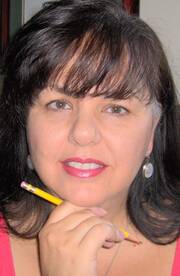 © Dr. Lynn Gehl, Gii-Zhigaate-Mnidoo-Kwe Processes of colonization have been harmful to Indigenous people. Not only in terms of the denial of access to land and resources to live a good life, but also in terms of the way knowledge has been gathered, interpreted and constructed into institutions, policy, and law; as well as the process of dissemination. This colonial process of knowledge production is no longer acceptable practice as Indigenous people have had enough. There has been a paradigm shift in the academic world. Today, it is expected that Indigenous communities and people be included in defining and determining research questions, defining and determining research methodologies, and defining and determining the process of interpreting data. We are also involved in defining and determining acceptable means of disseminating the knowledge. Standards of best practices must apply. The Tri-Council Policy is a world model for ethical academic research. Chapter ten of the policy is dedicated to offering guidelines regarding research with Indigenous communities and people. Interestingly, the Tri-Council Policy clearly states that it does not override or replace the ethical guidelines that sovereign Indigenous Nations have in place – both oral and written. As such, in many situations it is necessary for researchers to undergo two research ethics review processes before moving ahead in their research. The Mi’kmaw Ethics Watch is one such Indigenous body which assures Mi’kmaw Indigenous knowledge is both respected, and protected from outsiders doing harmful and interfering research. If you are in a cyber-net community conducting research of any kind without the full and informed consent of the people, you are engaging in unethical research practices. Keep in mind here that community is no longer defined as on the ground. Rather, it is more broadly defined. While it may be argued that news reporting research is not bound to the rules of the Tri-Council Policy, but rather the rules of journalism where knowledge and information obtained in public settings such as social media outlets is publishable by law, this rationale is poorly and incorrectly applied to Indigenous communities, Indigenous knowledge, and Indigenous intellectual property. In this situation the laws and policies of Indigenous Nations − again, both oral and written codes of ethics − override the rules of western journalism. Further to this, Article 31 of the United Nations Declaration on the Rights of Indigenous Peoples, an international norm that has force, states: “Indigenous peoples have the right to maintain, control, protect and develop their cultural heritage, traditional knowledge and traditional cultural expressions, as well as the manifestations of their sciences, technologies and cultures, including human and genetic resources, seeds, medicines, knowledge of the properties of fauna and flora, oral traditions, literatures, designs, sports and traditional games and visual and performing arts. They also have the right to maintain, control, protect and develop their intellectual property over such cultural heritage, traditional knowledge, and traditional cultural expressions.” For news reporters to enter into our spaces, communities, cyber-net communities included, and mine our minds and experiences for knowledge, while at the same time not asking Indigenous people for guidance in shaping the research, or asking for guidance in how the research should be disseminated; and further to gain economically from the knowledge yet give nothing back to the people, is unethical. Furthermore, for a news reporter to argue otherwise based on the rules of western journalism as the rationale that guides their work is unethical, not to mention an oxymoron. Let’s face it, if you are truly interested in serving Indigenous people, and our needs and our knowledge, it makes no sense to simply ignore our rules and laws of ethics. Indigenous moral codes operate through an internal locus of control, meaning individuals are socialized in a way where we are expected to govern our own behaviour from the inside, rather than through external apparatus such as police, fines, written laws, courtroom proceedings, and judges. In situations where a person’s moral code is not working, community members and allies will come forward and tell you where to go, and where precisely to put your desire for knowledge, the goal being to end unethical research. The Idle No More movement gained currency through the tools of social media. Our Facebook groups, Facebook Fan Pages, and Facebook Event pages are more than simply places for you to mine for knowledge through your narrow models of research, while at the same time offer nothing back in return for the knowledge. If you are engaging in this method of research, this is analogous to the colonizer mining Indigenous land for resources where Indigenous communities gain nothing in return.  Dr. Lynn Gehl is an Algonquin Anishinaabe-kwe from the Ottawa River Valley. She has a section 15 Charter challenge regarding the continued sex discrimination in The Indian Act, she is an outspoken critic of the Ontario Algonquin land claims and self-government process, and she recently published a book titled Anishinaabeg Stories: Featuring Petroglyphs, Petrographs, and Wampum Belts. In her spare time she carves nickel-sized turtles. You can reach her at lynngehl@gmail.com and see more of her work at www.lynngehl.com Constructs, models, theories, and policies while never offering universal truths, serve humans in that they guide our emotions, thoughts, and practices as we move forward. All human groups need them. To be without them, is to exist in chaos and thus go nowhere. After years of participating in the Algonquin land claims and self-government process in Ontario where experts were guiding the process, eventually it became apparent to me that I was situated in an awful context. Assisting state nationalism as they were, these so-called experts offered no real discussion, commentary, or teachings on the difference between the treaty process and the land claims process. Rather, they cleverly employed terms such as “government to government” versus “nation to nation”. Some even promoted the land claims and self-government process and the pitiful settlements through comparing the process to class action law suits against an employer such as the grocery store FRESHCO for example. Eventually, I realized these lawyers, anthropologists, and so called friends of the Algonquin Anishinaabeg were really serving Canada’s colonial agenda. I realized that the land claims and self-government process is about the government of Canada gaining access to and exploiting Indigenous lands and resources while at the same time giving Indigenous Nations mere crumbs and dirty water to subsist on. Canada does this, I learned, through unilaterally constructed and genocidal polices such as the Comprehensive Land Claims Policy and the Inherent Rights Policy. I was floored, as I had so hoped that the Algonquin land claims and self-government process would result in viable and meaningful self-government for the Algonquin. Not so. Recently the offer was tabled: 1.3% of our land and a $300 million one time payment. Eventually I found I had to do something constructive with the knowledge that I gained from this awful experience and so I once again pulled myself off the floor, gathered some of my thoughts, and compiled them into my Ally Bill of Responsibilities. I felt the people assisting the Canadian state’s agenda needed to know that I knew full well that they are not really allies, but rather they are agents of a genocidal colonial agenda. I compiled my Bill quite some time ago, publishing the first version in Canadian Dimension magazine. Many allies have emailed me since this time to let me know that they found the Bill useful, and to tell me that they rely on it to guide them in their emotions, thoughts, and practices of allyship. Many Indigenous people have also informed me that they find the Bill affirming and useful in their work. Still further, students have emailed me to let me know that my Bill was a reading in one of their university courses. While I know the issues put forward through the passing of Bill C-45 into law are not just an Indian matter, in my need to offer something constructive to the IdleNoMore movement I have taken the time to post a more recent and accessible version my Ally Bill of Responsibilities on many Facebook event walls as well as in groups. In my decision to do this I really have to credit Barbara Low for instilling in me the value of my Bill and for encouraging me to give it more currency. For this I am grateful. Posting my Bill on Facebook is a reasonable and constructive practice in that, after all, we have experienced a social media revolution. In fact, it is the social media revolution that is credited for the Canada wide, America wide, and now global wide IdleNoMore movement. Through this effort, once again I have been receiving positive feedback from both allies and Indigenous people who are finding the Bill useful in guiding their emotions, thoughts, and practices. Some people have even requested permission to translate the Bill into other languages. This makes me very happy and through this heart knowledge a flicker of hope is birthed. My Bill is available here at this link: http://www.lynngehl.com/my-ally-bill-of-responsibilities.html Other people, though, have pointed out that they do not like the words “behind” and “secondary” that are in my Ally Bill of Responsibilities. I address these concerns through explaining that in any social stratified society, people on the lower rungs of society – such as young Indigenous mothers and persons with disabilities − require allies to stand behind them in the process of collectively challenging oppressive regimes. Let’s face it, in a socially stratified society people are not equals, and real and effective change will only happen when people understand that those who are worse off require allies to stand behind them in their movement forward. It is my view that those people most denied need to lead the way forward, that is if emancipation for all is the desired outcome. I then point out that to stand behind and secondary to others is indeed a place of honour, and that they should reconsider their process of ascribing negative meaning to these words. Further, although I do not use the terms “settler ally” and “descendant of settlers ally” in this Bill, I do hear these terms and I rely on them too. I have found that some people do not like these terms. I find this interesting and wonder why they once again ascribe negative meaning to these terms. Many people offer that they were born in Canada and that they are proud to be Canadians. They also say that their family has been in Canada for many generations. I do hear what these people are saying, and I do value what they are saying. In response, though, I also offer that when I hear people use these terms to describe their location in the Canadian mosaic, I attribute to them as having a critical perspective. That is a critical perspective of state nationalism, its limitations, and the propaganda that the Canadian state and its education system has so carefully planted in the hearts and minds of everyday Canadians as a measure to control their emotions, thoughts, and practices. I further interpret the use of these terms to also mean the door is still open for these people to return to the rituals and ceremonies of their ethnicity and their Indigenous knowledge. After all we are all Indigenous to the earth and we all have our own Indigenous knowledge that we can draw from to guide us forward. This interpretation of mine makes me feel very happy and helps me move forward to a dreamed future. These people who think of themselves as “settler allies” or “descendants of settler allies” offer me hope, and they lift me off the floor that Canada’s genocidal policies and practices have thrown me to. When I think critically about how the Canadian state continues to undermine Indigenous people and our treaty rights, I realize that in passing Bill C-45 Prime Minister Stephen Harper has taken on the action of an agent provocateur where his goal is to disrupt the ally relationship between Indigenous people and the average Canadian. What I mean by this is that while certainly Harper has passed legislation that will harm all Canadians, he has strategically placed Indigenous people and their ally relationship with settler allies at risk. In doing this Harper has shifted the real focus of Bill C-45 to being an Indian thing where consequently Indigenous people become targets of anger and racism. Through this process, Harper gains angry and reactionary support in fulfilling his economic political agenda. I have learned there is the need for Indigenous people to nurture our relationship with allies. In my needfulness and hope that more and more Canadians are waking up to the methods of propaganda that the Canadian government uses to control their emotions, thoughts, and practices, I asked “allies”, “settler allies”, and “descendants of settler allies” to send me their photographs as IdleNoMore supporters. I offer this collection here for others to experience. Please take the time to like, tweet, and share this blog.
12/16/2012 61 Comments Algonquin Anishinaabeg Genocide © Dr. Lynn Gehl, Gii-Zhigaate-Mnidoo-Kwe
Just as Chief Theresa Spence of Attawapiskat First Nation is in an abusive relationship with the Canadian state, so is the Algonquin Anishinaabe Nation: An abusive relationship that will lead to our genocide. While Chief Spence is currently spending her days on a hunger strike asking that Indigenous treaty rights be respected, the Algonquin are asked to contemplate a pitiful settlement. The irony is not lost on me that Chief Spence has chosen to carry out her hunger strike on Victoria Island, currently unceded traditional Algonquin territory. In the process of building Canada, the British strategically imposed different languages (French and English), religions (Catholic and Protestant), and legal systems (French Civil Law and British Common Law) on the Algonquin Anishinaabe Nation, and in this way divided us into two entities. While today Canada consists of many provinces, in its early stages it consisted of only Upper and Lower Canada, which are now the provinces of Ontario and Quebec. During the early stages of European exploration the main mode of transportation into the land mass of New France was of course the Ottawa River. The individual Algonquin bands located on both sides of the river were some of the first Indigenous Nations recorded by Champlain and so you can be sure that the French and British knew full well who we were. Through European struggles for new land the Algonquin Anishinaabeg were allies with the French, and for this we were severely punished when the British eventually took over. The British imposed this punishment through very manipulative ways. Members of the Algonquin Anishinaabe Nation were constitutional delegates and runners during the 1764 Treaty of Niagara where Canada’s original constitutional documents were exchanged: the 1763 Royal Proclamation, the British and Great Lakes Covenant Chain Confederacy Wampum Belt, the Twenty-Four Nations Wampum Belt, and the Two Row Wampum Belt. These documents collectively codified and guaranteed all Indigenous Nation’s jurisdiction and our right to land and resources through peace, friendship, respected and the continued need to polish and work on our relationship with one another. Following Creator’s law Indigenous Nations agreed they would share with the European Nations. Regardless of Algonquin Anishinaabe participation at this event, for centuries afterwards British Canada ignored our endless petitions for land and resources. This went on for centuries as the Algonquin submitted over 28 petitions asking that our right to land and resources be respected as outlined during the 1764 Treaty of Niagara. Regardless of this long time heroic effort, members of the Algonquin Anishinaabe Nation were relegated to the margins when they were continually denied. Historical records expose that British Canada argued the Algonquin Anishinaabeg use and settlement made adjacent land undesirable for the arriving British settlers. Yes, that is right we were undesirable in the British eyes. In 1853, through The Public Lands Act, our land was granted free to European settlers. Again in 1868, through The Free Grant and Homestead Act, our land was granted free to European settlers. The Algonquin, though, were not entitled. In the 1880s British Canada began criminalizing our culture, the very entity that made us human beings. Our ceremonies, dances, and methods of prayer were all criminalized. In 1927, Canada made it illegal for us to hire lawyers to carry our grievances for land and resources forward. In 1864 the Algonquin living in Upper Canada were provided with one reserve where all further requests for land were then denied as we were told to go to the Golden Lake reserve. Of course many Algonquin opted to remain on their land where they existed long before European settlers arrived. Regardless of this effort to hold on, many Algonquin lost their land to European settlers when they followed natural law leaving the land in the winter to hunt, as well as when they could not pay the land taxes imposed on them as they remained within a subsistence versus the wage economy, or because they preferred to allow the animal beings to exist as the Creator intended them to be rather than farm the land as Europeans did. To further punish the Algonquin Anishinaabe Nation we were also denied land and resources during the historic treaty process. It was in 1923 when Canada once again ignored our participation in the 1764 Treaty at Niagara when our land and resources were identified under the terms of the Williams Treaty, yet we were not present during the negotiation process. As an Algonquin Anishinaabe-kwe I have asked myself many many times what is it about the Algonquin Anishinaabe Nation? Why is it that successive generations of the Canadian government have continually denied and ignored our very existence? Yes, I agree all Indigenous Nations are being undermined and denied, but there is something special about the Algonquin Anishinaabe Nation, so special in fact that Canada would not even negotiate with our ancestors during the historic treaty period, yet they clearly knew who we were. This practice of ignoring the Algonquin Anishinaabe Nation was particularly perplexing for me in that we all know Canada’s parliament buildings reside on Algonquin Anishinaabe land. My experience as a Canadian was particularly disenfranchising. Things made no sense. As I spent time on my grandmother’s home reserve and experienced the atrocity of the conditions, I felt invisible. My Algonquin Anishinaabe reality, and how I felt about this reality, I thought must not be real, nor significant for anyone to care about. After generations of Algonquin Anishinaabe petitions and only after we were in a particularly pitiful state of poverty and division, eventually Canada reluctantly entered into a land claims and self-government negotiations process with the Algonquin of Golden Lake, now Algonquin of Pikwàkanàgan First Nation. In this process only the Algonquin living in Ontario are involved where through this process all Indian status members, approximate 1800 members, are accepted as beneficiaries. So too are the approximately 6,000 non-status Algonquin accepted as beneficiaries. While currently many of the non-status Algonquin are being challenged, questioned, and denied the right to who they are, and thus the right to vote in the final ratification of the final settlement offer, and I feel the disenfranchisement that they must be experiencing, there is a bigger issue that needs to be realized. We cannot afford to think in a linear way, we must look more broadly at the offer on the table. Through the two policies – the Comprehensive Land Claims Policy and the Inherent Rights Policy – that the Algonquin are negotiating under, and for that matter all Indigenous Nations in Canada, our jurisdiction, land, and land related rights are not protected but rather further denied and placed within the confines of a small b□x. Through these two policies Canada imposes on us what Canada thinks Indigenous Nations are entitled to: a very small percentage of our traditional territory and a one-time buy-out. Clearly 117,000 acres which merely amounts to 1.3% of our traditional territory and $300 000 000 is a bad deal. It certainly violates the agreement as codified in the three wampum belts exchanged during the 1764 Treaty of Niagara. This pitiful settlement offer, where we are denied the very land and resources that would provide for our livelihoods as we define them to be, and for future generations of Algonquin as they define them to be, is indeed an act of genocide as defined by both Raphael Lemkin and the United Nations Declaration on the Prevention and Punishment of the Crime Genocide. My Algonquin ancestors such as Rodney Gagnon, Viola Gagne, Joseph Gagnon, Annie Jane Meness, Angeline Jocko, Francis Meness, and Alphonse Dufont Jocko would be horrified with such an offer, so horrified in fact that they would paint their faces black, be idle no more, and stand with and behind Chief Theresa Spence. Be sure I am not alone in making this argument. Many have made this argument before me. Don’t hate me because I am pointing out the error in the ways of so called Algonquin leadership sitting at the table and making a deal with the devil. And yes, I do appreciate their heads are in a vice. Regardless, it is a bad deal that will only lead to our demise. Vote “NO!” It is the only way. Please, like, comment on, and share this Black Face blog. 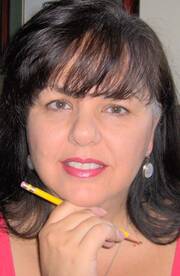 Inherent in every word is an ocean of potential meaning. People who critique a word usage without understanding the other person’s intended meaning are engaging in idolatrous thought and practice. People who allow text alone to inform their meaning-making and thinking process really do not value the oral tradition and what it has to offer. Ascribing negative or positive meaning to a question asked is an act of your agency, not an act of the person who asked the question. Carefully consider and ascribe your meaning. When most people learn a new word or concept at first they have a tendency to be reactionary, doubt it, deny it, and sometimes dismiss it as – “oh those academics”; when what is really needed is for them to allow time to pass so they can develop a relationship with the new word or concept. Linguistic essentialism and those who promote it are not experts in the many and diverse ways that humans communicate. Theories, models, concepts, and words are not so much reality as they are representations of reality. People who think and act otherwise engage in idolatrous thought and practice. Some people do not think conceptually. They have other gifts. Learning new knowledge can be emotional. If you are not angry with your “teacher” it may be because they have yet to teach you something new. Most people do not reflect on their cognitive process and factor this process into what may be limiting their understanding of a new idea, concept, theory, or model. Making something with your hands and gifting it to others has medicinal elements inherent. All people perceive. There is no such thing as objectivity. If anything, objectivity is something we sometimes strive for, although we never completely get there. Heart knowledge, the location where the human spirit emerges in its anthropomorphic form, lacks mind knowledge and thus is not wholistic. Rational knowledge alone is not complete, nor wholistic; heart knowledge is required. Not liking particular knowledge should differ from how you feel about the messenger of the knowledge. When reading a book or article, people really should do so in layers: methodology with method inherent, and the knowledge product. This is the case even when the author does not offer their approach explicitly. Through my experience I have learned that those closest to the truth are often times the most ridiculed, undermined, and disenfranchised. The fact that Canada’s Parliament buildings reside on traditional Algonquin territory, yet the Algonquin were ignored during the historic treaty process, is the best example of this. Unfortunately, this process of denial is played out daily in many of our relationships. If you do not go back to your own Indigenous Knowledge – practiced, embodied, and felt – your mind will not be able to read your soul. Remember, if you want to know who someone really is – pay attention, observe, and watch how they treat others versus merely to how they treat you. The person may simply want something from you and thus act according to that need versus in a way that is truly them. State nationalism places genuine subjectivity into a pinhole. The olympic events is one such avenue into this pin hole. Women who say things are changing really need to back this up with some long term factual evidence of the change. They should also qualify for who things have changed. Otherwise, their comment is both disenfranchising and a barrier to real change. In understanding and valuing the effects of power, as you move down the ladder of social stratification one must appreciate there are interaction effects, as the total effects of power is far greater than the sum of its parts. Internalized oppression, the effects of sexism and racism, and the reality of lateral violence are denser as you move down the ladder of social stratification. Do not assume people at the bottom have a handle on it. Responsible allyship means refusing to ally with people who are not, or who refuse to be, financially accountable to the allies. I would rather respect my boundaries and say “no” when I can’t do something for you. My integrity means much for me. If this is hurtful, imagine how it would hurt you is I said “yes” and did not come through? Please like and share this blog. Chi-Miigwetch 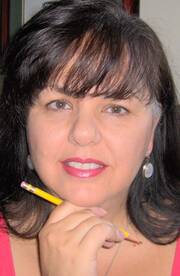 “Indigenous Knowledge Gushers” and Harmful Patronizing Relationships Clearly, relationships mediated and sustained through a skewed power dynamic are dangerous to people outside the immediate relationship. It has been my experience that there is little that is more dangerous than patronizing relationships. To engage with and sustain a patronizing relationship serves to fortify oppressive structures versus truly revolutionize them. Within the context of an outsider’s need for Indigenous knowledge (IK), if one’s moral code is bent because of their selfish needfulness they fail to have the guidance of a moral code. I have found that non-Indigenous people who selfishly bend their moral code for greater access to IK dangerous to Indigenous people. Previously I have recognized that allies and friends interested in the emancipation of Indigenous people are in need of guidance and a framework to think and act through. Along with this blog previously I have offered my Ally Bill of Responsibilities. I have also written a short blog about some of my experiences where non-Indigenous people were selfish and patronizing in their need for IK in a way that was harmful to me and others. Here are the links to this work: http://www.lynngehl.com/gehl-ally-bill-of-responsibilities.html http://www.lynngehl.com/2/post/2012/04/on-indigenous-knowledge.html Recently I encountered a situation where a “traditional person”, or better said “someone who likes to think and sell themself as a traditional person”, informed me that they do not like the work I do as a critical thinking Indigenous scholar: that is where I critically examine, think, and talk about the questionable selfish and patronizing relationships that many non-Indigenous people engage in that ultimately hurt Indigenous people. Of course this “traditional person” did not name it as such. Rather, what they did was spin the very reaction others have to the work I do in their own favour. Clearly some Indigenous people prefer to be patronized rather than see genuine change for Indigenous people. Alternatively stated, many non-Indigenous (and for that matter Indigenous people) negatively react when asked to critically examine how they are engaging with and sustaining what I call “Indigenous knowledge gushing practices”. It is precisely this negative reaction that people have that was spun against me in an effort to get me to stop doing what I do. I have come to recognize this process of spinning people’s negative responses as the ultimate manipulation. Of course some people do not like being asked to critically examine what they are doing. They are needful and have no problem gaining IK void of critically thinking and engaging in ethical practice that is mindful of the larger political context that Indigenous people are situated. And of course some Indigenous people, such as the Indigenous spinner discussed, do not like having critically informed non-Indigenous people as it takes away from their own needfulness for affection. I assume the affection makes them feel good. Regardless, it is my contention that critically informed allies and friends are best even if in the beginning they prefer not to be asked to critically think about what they are doing. That said, even if I am not liked for delivering the message that Indigenous Knowledge gushing practices are dangerous and an interference to genuine emancipation I will continue to do the work I do. Let’s face, patronizing relationships serve the hegemonic status quo: that being oppressive power structures. Thus I must gumption the moral courage to do what others prefer me not to do regardless of the negative responses and potential manipulation by spinners. The good news is I am hearing from a small minority of critical thinking non-Indigenous people who are genuinely grateful for guidance in their effort at being a good friend and ally to Indigenous people. I have come to realize that they too are annoyed with the patronizing relationships that interfere with broader community politics and the self-determination of Indigenous people. These informed friends and allies know full well that the emancipation of all oppressed people will not take place through dangerous patronizing relationships. Clearly “traditional people” who label critically thinking Indigenous scholars and the work they do as “negative” or “difficult” are manipulative, selfish, and have a bent moral code. After all genuine traditional people and critical thinking scholars have the same goal: the emancipation of Indigenous people. In sum, Indigenous people are in need of genuine critical thinking friends and allies rather than what I have come to call “Indigenous Knowledge Gushers (IKG)” who patronize for their own needfulness. Please click on "like" to share this blog. You can also post a comment here. Miigwetch 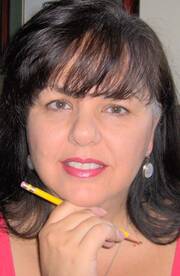 Dear White women and men, The other day I encountered a White man – he had African Indigenous art all over his walls. As we talked he began to argue that all my Indigenous knowledge (IK) was lost. I said to him, "no it is not, my IK is all around me, and further as a matter of fact it is sitting right in front of you (meaning me)." When I returned home and thought about it more, I realized that it was his IK that is lost to him – not my IK to me. And this is why he collects the IK of other nations and nails it to his walls. It is a projection of his own loss. The other day I was walking with an elder – or better said an Indigenous man. Eventually we encountered a White woman in desperate need of IK. It was in the way that she looked at him with worship in her eyes and glee on her face that helped me appreciate the interference of a "White woman's gaze". I could never genuinely look at an "elder" in that way – man or woman. When I thought about it more I realized that the adoring White woman made me more vulnerable than I already am. Oh, how I wish that White women and White men for that matter would take the effort and return to their own IK and leave other Indigenous women and men the space they need to do the work they have to do. And yes, I do know that some "elders" want and expect White people to look at them in a particular way – this is precisely one aspect of my point. The other day I observed an Anishinaabe man engaged in ceremony. It was apparent that all the White women and White men thought he was a great holder of IK. In my mind I thought when the day comes that he has an Indigenous woman (not a White woman) of equal status working in equal unison with him will be the day that I consider a man a great holder of IK. The other day I encountered a White woman who argued that it is okay for others to rely on Indigenous men and the IK that they carry void of the presence and participation of women. This person argued this even though she knew full well that patriarchy was an issue in our society even for the men she loves and cares for. "Why is it then that the exotic Indigenous man is good enough for her?" is a question I ask myself. Obviously this person has not learned the lesson that gender balance is fundamental before all else. One reason I suspect she thinks it is okay is because this man and his knowledge came to her in a dream. In any one of the IK traditions a White woman's dream or vision does not represent IK, the ultimate truth, nor for that matter what is sacred. I know many Indigenous people who do not think the way White men and White women fortify yet another oppressive patriarchy is okay. Many know that your need for other peoples' IK is a barrier to our wellness and the community work that we have to do. That said, if you really want to do contemporary IK work such as address some of the injustices imposed on us, help Indigenous women as we define help to be, not as you define help to be. For example, many know that Indigenous women are more likely to suffer from sexualized violence. There are now over six hundred missing and murdered women documented in Canada. Further, forty-five percent of Indigenous mothers age fifteen years and under have a child where the father's signature is not on the birth certificate. Often times this lack of a signature is not the mother's fault. Rather, rape, gang rape, and other acts of sexualized violence; as well as fathers refusing to officially acknowledge with a signature that they are the fathers are some of the reasons why this this happens. As a result of the lack of a father's signature many mothers and babies of Indigenous nations are placed in vulnerable locations in their communities and are denied their treaty rights such as housing. Having voiced this, also know that people genuinely interested in the revolution of IK must begin with their own IK. We all have it - even White people have it. Yay! As Anishinaabe respected traditional knowledge holder Jim Dumont has stated - all people need to go a back to their own IK. "What is this some may ask?" It is the knowledge that predates patriarchy, industrialization, materialism, and the economic paradigm that is now hegemonic. Go find, express, and celebrate your own IK. Clearly, as we move forward other peoples' IK must not be a free-for-all. If it were a free-for-all no one would do the hard work they have to do and sadly we would remain void of significant IK. Further, our attempt at gaining the required critical mass would be confounded if we simply took other peoples' IK. Interestingly, after wrestling with the dynamics impinging on your own IK you will have a better idea of your place in other peoples' IK traditions. Worthy of stressing in your process to your IK you need to be cognizant of the fact that we should not step on other people as we collectively come to IK. Feminist theory is careful to point out that in our effort toward emancipation we must think and act in the context of respecting the needs of others who are less fortunate. Clearly one has not gained emancipation if they have denied others in their process of emancipation. White feminism was critiqued for not being cognizant of this a while back and has evolved to this more enlightened understanding. Thank goodness as Indigenous and Black women are in need of good informed allies. To this end, Dear Non-Indigenous White women and White men, it is not racism you experience from me. Rather, it is hurt and anger generated due to your need for "my" IK, a hurt no less that is generated by your selfishness and a lack of critical thinking. Stop defining these feelings through your need for "my" IK. Chi-Miigwetch, Here are some related links: Click here Click here 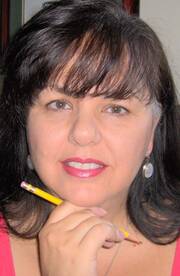 An Algonquin Anishinaabe-kwe View of the Nuclear Industry Contrary to what the television commercials and the nuclear industry would like us to believe the nuclear fuel cycle is far from safe and green. The process of mining, milling, and building nuclear power plants requires huge amounts of energy obtained from fossil fuels. Thus, this process alone produces carbon dioxide emissions and is not green. The nuclear fuel cycle is harmful in other ways. Nuclear energy depends upon elemental uranium 235, which is naturally radioactive and undergoes decay, meaning it spontaneously radiates or ejects radioactive energy. Once uranium 235 is removed from the earth and extracted from the ore that once cradled it, much soil and dirt is left behind. These tailings are loaded with other radioactive elements such as radon 222 and radium 226, which contaminate the air, land, and water tables in the surrounding areas for many years. People need to know that there are three forms of radiation that consists of both particles and waves: 1. Alpha particles 2. Beta particles 3. Gamma photons Radiation is undetectable through the human senses and this works against us in our learning and knowing process. Radiation harms us through ionizing the atoms and molecules that comprise our body cells, hence the term “ionizing radiation.” There are three ways that radiation harms us: 1. Radiation is carcinogenic, meaning it causes cancer. It only takes one radioactive particle, for example, to damage a human cell. Children are particularly vulnerable because their bodies are “containers” of much cellular growth. 2. Radiation is mutagenic, meaning it mutates our egg and sperm cells and causes birth abnormalities. 3. Radiation is teratogenic, meaning it has the ability to infiltrate the mother-child placenta barrier. Unborn babies are particularly vulnerable because their bodies are “containers” of much cellular growth. Uranium 235 is a gamma ray emitter, is carcinogenic, and causes bone cancer. Radon 222 is an alpha emitter, is carcinogenic, and causes lung cancer. Radium 226 is both an alpha and gamma ray emitter, is also carcinogenic, and causes bone cancer. These are the radioactive elements we are exposed to simply through the act of mining uranium. In addition to these radioactive elements, creating nuclear energy through uranium fission produces additional radioactive elements such as strontium 90, iodine 131, cesium 137, and plutonium 239. Strontium 90 is both a beta and gamma ray emitter and causes bone cancer and leukemia. Iodine 131 is both a beta and gamma ray emitter and causes thyroid cancer. Cesium 137 is also both a beta and gamma ray emitter and causes muscle and brain cancer. Plutonium 239 is an alpha emitter that is both mutagenic and teratogenic and causes genetic mutations and gross deformities in our newborns. Disturbingly, through the process of “venting,” nuclear reactors routinely release these radioactive by-products into the atmosphere. In this way too our air, land, and water becomes contaminated for many years. In summary, uranium mining and processing produces carbon dioxide. While this in itself means that it is not a green process, uranium mining also contaminates the air, land, and water with radon, radium and other radioactive elements. Furthermore, through the process of generating energy through uranium fission, additional radioactive elements are created. We simply cannot afford to limit discussions about safe and green energy to carbon dioxide emissions. We must also consider radioactive emissions. 1/3/2012 5 Comments Black Face BloggingMshkoziwin and Mkadengwe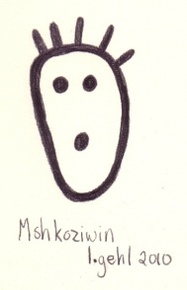 A Petroglyph Recreation © Lynn Gehl A Petroglyph Recreation © Lynn Gehl In the Anishinaabe tradition a speaker’s face is an important element of learning the intended knowledge. When someone tells a story the process of listening involves watching the facial expressions of the speaker as they convey if the speaker is happy or sad or in a state of wonder. If the speaker is sad the listener not only hears it in the stated words but also reads it on the speaker’s face. The same goes for joy and wonder. Through watching the emotions on the speaker’s face listeners feel what the speaker feels through a process of physiological synchronization. It is because of this process that it is stressed that listening in the Anishinaabe sense involves good eyes and a good heart rather than merely good ears. Many people skilled at the oral tradition rely on facial expressions when conveying knowledge. Further, in the Anishinaabe tradition there is a teaching that encourages people to show the good side of their face. Mshkoziwin is an Anishinaabemowin concept that references “the Art of Being Brave” and the process of finding one’s true face, or alternatively the need to get to know our core selves. It is often said that at times our greatest enemy is our self. To help remedy this there is the need to get to know our core being. Anishinaabe wisdom informs us that our essence is made up of two parts. While one part is positive, the second part is negative. Given this, there is the need for individuals to travel deep within themselves and get to know both their positive and negative sides. This requires bravery as the negative side is indeed difficult to befriend. Regardless, if we fail to befriend our negative side it could very well take over who we are. Alternatively, although our true face is the positive side of who we are, we must befriend our negative side and manage it in a way that allows our true face to manifest in the way we walk through the world. In the Anishinaabe tradition people also expressed times of bereavement through the practice of Mkadengwe which translates to Black Face. This tradition involved painting one’s face with black ash or paint to signify one’s state of being. In reading the person’s face members of the community were better able to affirm the mourner’s feelings and accommodate their needs when required. In following this later tradition of Mkadengwe over the next few months I will offer Black Face blogging as my way of expressing matters that I feel require thought. |
|
To subscribe to Lynn's Blog: click here
To subscribe to Lynn's Newsletter: click here To follow Lynn on her Public Facebook Page: click here To subscribe to Lynn's YouTube channel: click here To book Lynn as a speaker: click here To contact Lynn/License her work: click here Copyright Dr. Lynn Gehl, 2024 All Rights Reserved
|
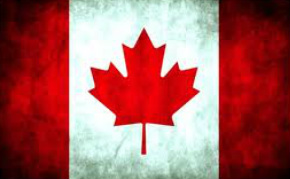

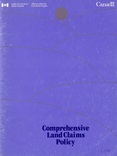
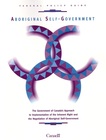
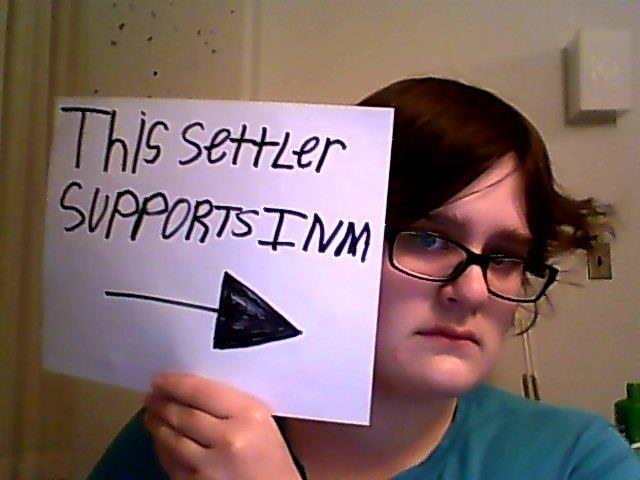
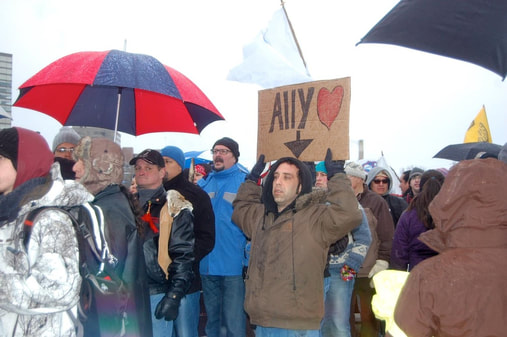
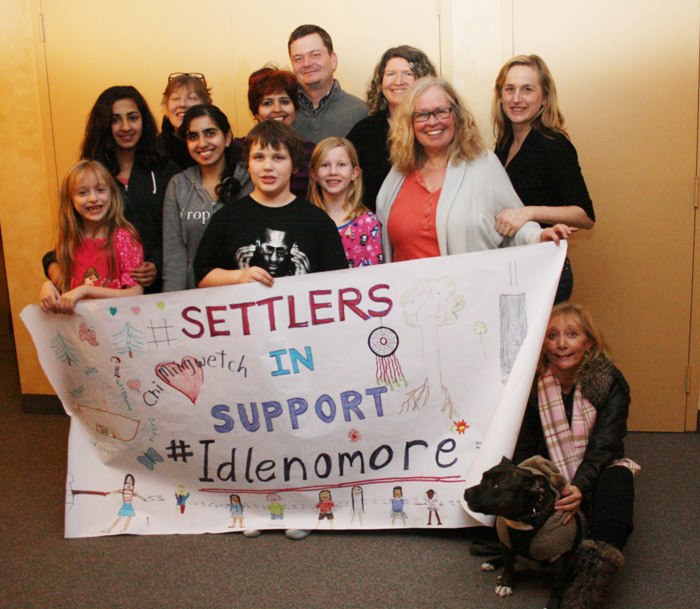
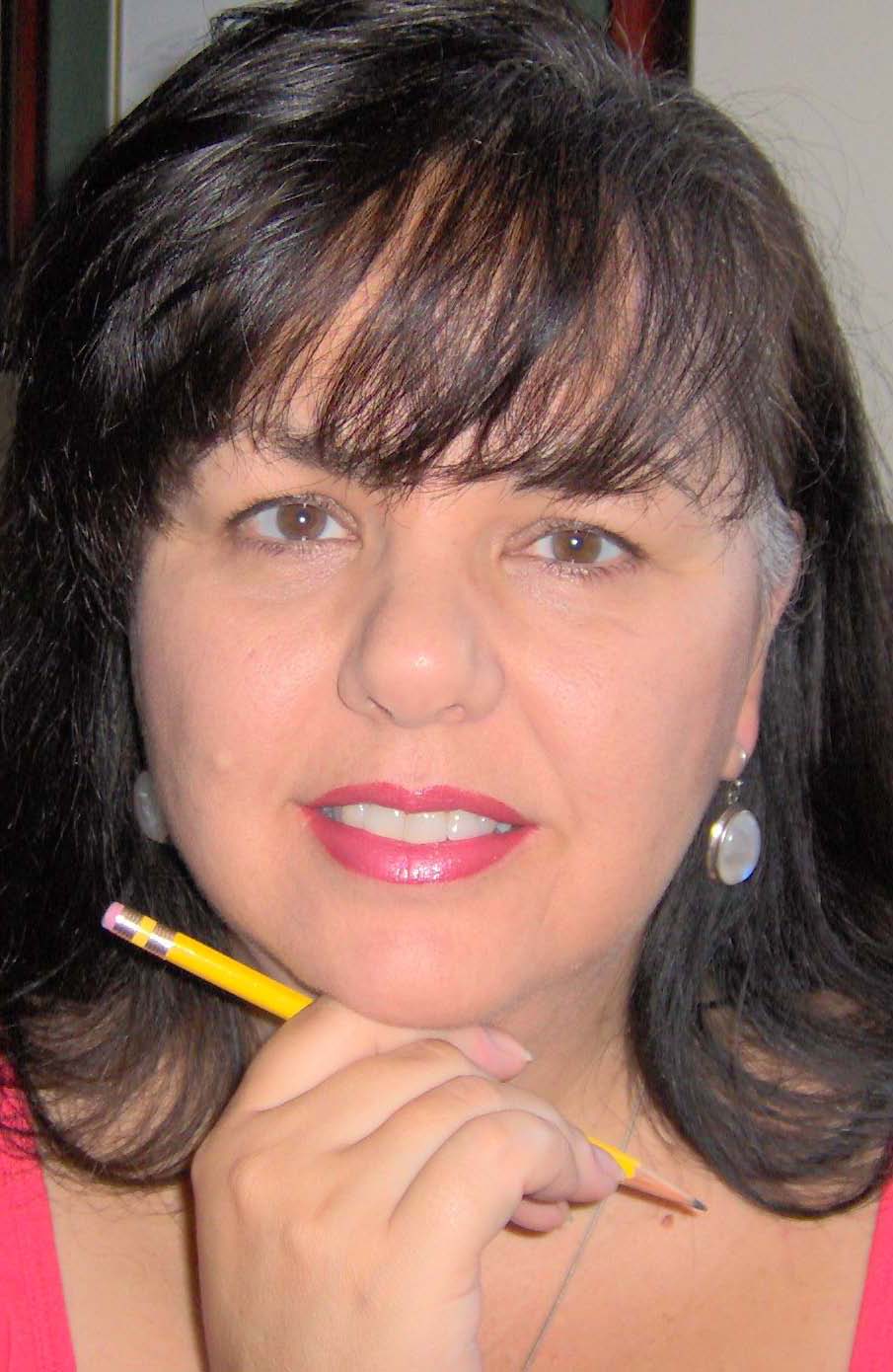
 RSS Feed
RSS Feed
